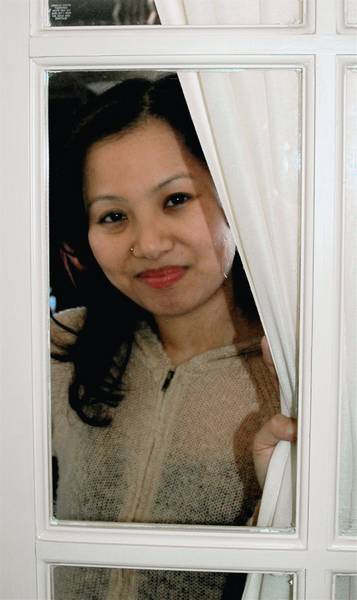PARK CITY, Utah – Julia Kwan, the director of one of the most beloved films at Sundance this year, didn’t touch a film camera until she was 23. She was studying to be a legal assistant. Her dad worked in a restaurant. Her mom worked in the garment industry. “I’ve yet to meet a relative who makes a living as an artist,” she says. When she told her mom she was studying writing at Ryerson University in Toronto, her sister told her, “Mom thinks you’re studying calligraphy.”
After more study at Norman Jewison’s Center for Advanced Film Study, where she made a short subject that played Sundance, she is back this year with “Eve and the Fire Horse.” It is the heartwarming story of two little sisters growing up near Vancouver and trying to combine Buddhism and Catholicism with Chinese beliefs about of fate and luck. It is not a children’s movie. It is a movie about children.
“I’ve had this idea for a long time,” Kwan told me Sunday afternoon. We were in the corner of a hotel suite with the sign “German and Canadian Cinema” on the door. It’s cheaper to double up.
“My grandmother died, and my father told me she was reincarnated as a goldfish. I thought that was beautiful. Then, when I was 8 years old, I was told in Christian school that grandmother was in hell, because she was a Buddhist.”
The Catholics told you that?
“Just Christians, but I made them Catholic in the movie because it’s more cinematic. What I wanted to show was how the minds of children work. They’re told the story of Moses closing the waters of the Red Sea over the Egyptians, and they want to know, why did all the horses have to drown? Kids see such matters as either right or wrong. What did the horses do to make God drown them?”
Kwan’s movie opens nationwide Jan. 17 in Canada. It doesn’t have a U.S. distributor yet. “It’s a specialized sell,” she said. “That’s what they say.”
These could be any kids, I say, but then I realize the distribution problem isn’t that the kids are Chinese – the problem is that the film is intelligent, delicate and touching, and distributors are looking for films that are hard, cynical and uncouth.
“The success of the movie ‘Hostel’ broke my heart,” Kwan said.
Yeah, I said, make a horror movie that’s more gruesome than the last one, and that’s what will sell.
“At least Cronenberg’s ‘A History of Violence’ was about the consequences of violence,” she said.
Where did you find those two little girls, I asked. Phoebe Jojo Kut and Hollie Lo play Eve (born in the year of the fire horse) and her slightly older sister Karena.
“They came in as friends of other girls who were auditioning. We needed Chinese Canadians who spoke English, but could at least understand Cantonese, so when their parents were talking they’d look like they understood. Phoebe’s second audition, she did the scene where she tells her mother she saw her grandmother’s ghost, and she had everybody in the room in tears.”
Are you parents proud that you’re at Sundance?
“I don’t think they know where Utah is. The film was screened in Vancouver, and a friend who was sitting behind my father said he cried. I have only seen him cry twice in my life. So I know he liked it. We don’t really talk much about things like this. Some Chinese magazine interviewed my mother, and she talked proudly about how I had a job at a bank that paid $10 an hour.”
Your adult lead is a big star, I said. Vivian Wu.
“A wonderful actress. She was so big I didn’t even know if she would read my script, but she said right away she wanted to do it.
She is so good. Here at Sundance some interviewers have actually asked her if ‘Eve and the Fire Horse’ will be her American breakthrough. Here is a woman who starred in ‘The Pillow Book’ and ‘The Joy Luck Club’ and ‘Heaven and Earth’ and a lot of other big movies. I thought that was kind of insulting.”
If they’re that dumb and yet they think “Eve” could be a breakthrough, I thought, at least that means the film made an impression. Although I wouldn’t recommend it to the audience for the horror movie of the week. You don’t want to overload those brain cells. Could cause a thought or something.












